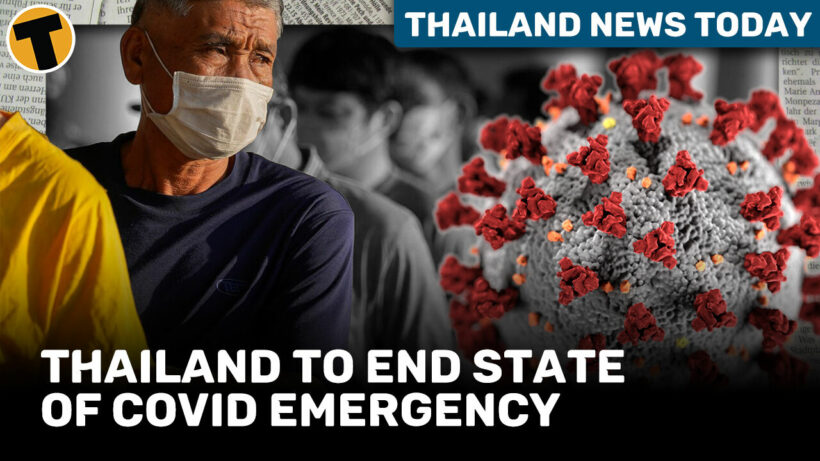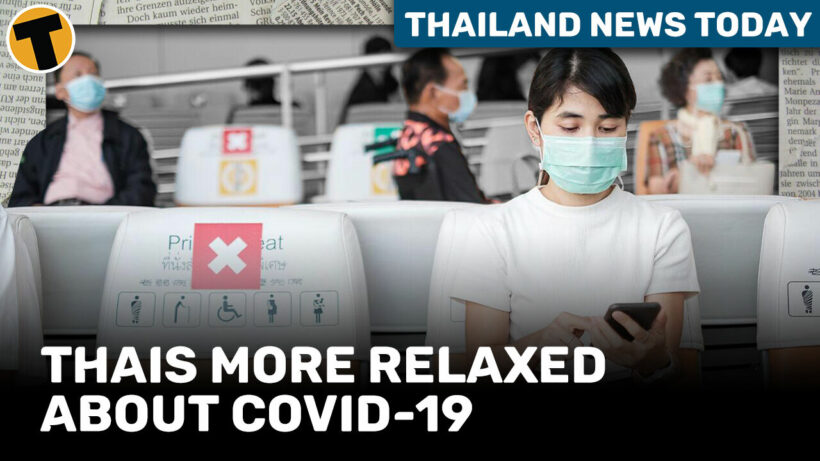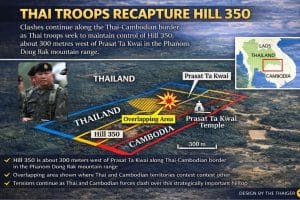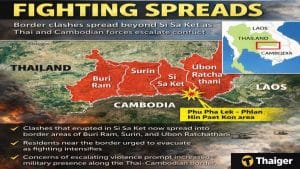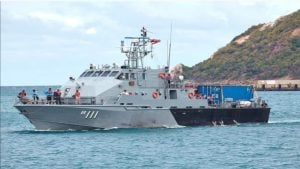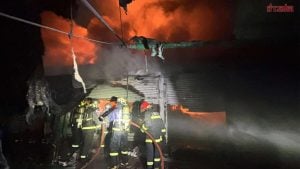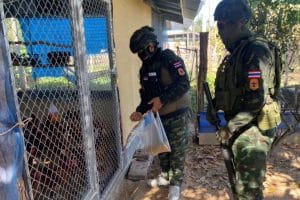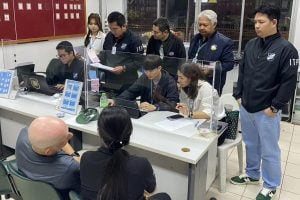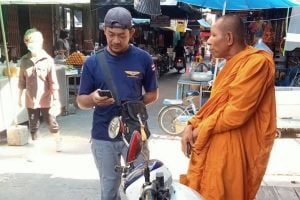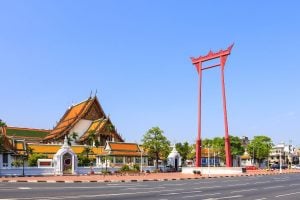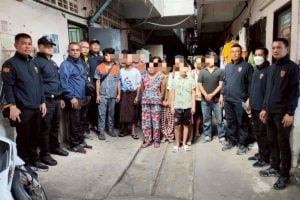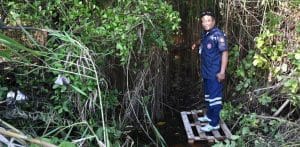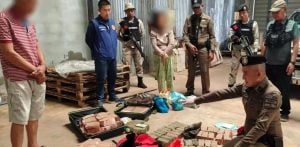Thailand News Today | Thailand or Cambodia? Comparing 10 year visa programmes

Thai health authorities insist that the latest Covid wave in Thailand will be “small and controllable”, and should be called a “mini wave” not a new wave. Think – just the tip, not the full on thing.
The Director-General of the DDC, Opas Kankawinpong, informed the media that the Omicron sub-variants BA.4, and BA.5, do transmit pretty quickly but do not cause severe symptoms. Therefore, upcoming strain isn’t serious and should not be counted as a new wave. The director said
Press grilled the DDC director general to determine the definition of what’s to come.
“We would call it a mini wave,” Opas said.
Opas reported Thailand has relaxed pandemic prevention measures and would focus on the numbers of severe Covid patients and deaths. He says that the Thai public health system can still handle the situation for now.
Opas answered questions about the lack of hospital beds saying that most of Covid patients in the hospitals now only had mild symptoms. He revealed that most of those patients in hospitals now had asked to stay in hospital so they could claim their Covid insurance, because some insurance companies only pay compensation to patients admitted to a hospital. Opas added hospital beds were available, and the emergency wards were ready.
Opas said that no one knows the real number of Covid cases because the majority of patients with mild symptoms test themselves with ATK tests and stay home. Therefore, counting the daily new cases isn’t necessary. He added that the number of patients with severe symptoms at a hospital would measure the situation more precisely.
Opas said he would announce more updates after the next meeting of the CCSA.
————
In a bizarre twist of fate, insurance companies are saying THEY have been scammed out of 500 million baht from people submitting fake Covid insurance claims.
Evidence has emerged that thousands of people who bought the “Found, Paid, Done” Covid-19 insurance scheme submitted fake documents for compensation totalling an estimated 500 million baht.
Anyone found guilty of using false documents faces 3 years in jail and/or a fine of 300,000 baht, but that apparently didn’t stop the thousands of people who did it.
The president of the Thai General Insurance Association, Anon Vangvasu, says many members of the association have complained about false claims made by their clients.
In an unusual practice, a number of insurance companies quickly paid out to customers who were claiming for Covid-related health reasons. But when the outbreak eased, insurance companies double-checked records with hospitals where their clients had treatment and discovered that many of the supposed hospital-issued documents were bogus.
The high number of COVID-19 claims on the “Found, Paid, Done” insurance policy has pushed a number of insurance companies close to the edge. Many of them are experiencing significant financial losses, and some of them have requested bankruptcy protection.
—————-
The Bangkok Mass Transit Authority will partner with private companies to run 200 electric buses to increase capacity so it can transport up to a million people each day. The new electric buses are also part of the city’s efforts to upgrade its old bus services and reduce Bangkok’s overall carbon footprint.
The new electric bus system will rapidly fill the gaps in the regular scheduled services for commuters and, over time, lower air pollution around the Thai capital.
The contract will be for a 2 year period and will be outsourced to private companies. The first round of services will begin later this year in November with 90 new electric buses.
It will run along a number of important routes, such as from the new Bang Sue Grand Station and the Queen Sirikit Convention Centre.
The BMTA says it doesn’t have the cash to afford new buses to upgrade its operations, but will be able to partner with private companies to provide the new services around the city.
Bus shortages have been a problem for the BMTA, forcing commuters to experience lengthy delays.
With increasing fuel costs, the number of commuters increased as well, climbing from 600,000 to over 700,000 per day.
The BMTA estimates that it will need to add 224 electric buses due to the increase in demand.
Currently, there are 2,885 public buses running on 107 routes, making 17,000 trips every day. The BMTA will increase the number of trips each day to 19,000 rides.
——————————–
A series of continuous 4 – 4.9 magnitude earthquakes struck the Andaman and Nicobar islands for a period of 3 days, 506 kilometres away from Thailand’s Andaman coast. More than 40 tremors occurred, beginning July 4 at 6:00am and continuing until this morning, July 6.
According to Thailand’s Metereological Department, the epicentre of the tremors was only 10 kilometres deep, making the chance of a tsunami extremely low.
In the rare occurrence that the tremors did trigger a tsunami, it would be low scale and not nearly as destructive as the 2004 Boxing Day earthquake and tsunami.
The series of tremors sparked concerns that two of Thailand’s tsunami buoys are not working. However, Phuket’s Department of Disaster Prevention and Mitigation said it would like to assure the public that there are good warning systems and response plans in place if a tsunami were to occur.
Phuket’s Department of Disaster Prevention and Mitigation confirmed that 19 warning towers around the island are working well. If a tsunami occurred, the towers’ alarms would sound loudly and issue warnings in 5 languages. The department said the towers’ speakers will be tested by playing the national anthem from the towers at 8:00am every Wednesday morning.
The department added that there will be a tsunami evacuation drill in Phuket’s Thalang district on July 20.
Meanwhile, Phuket’s Earthquake Monitoring and Surveillance Centre says earthquakes of 6.5 – 7.9 magnitude can trigger small-scale tsunamis that would not cause significant damage to property. Whereas 7.6 – 7.9 magnitude earthquakes can trigger tsunamis that cause significant damage, especially near the epicentre. Earthquakes with a magnitude higher than 7.9, and especially as high as 9.0, can trigger tsunamis that cause widespread destruction.
The centre says if a tsunami was approaching, there would be ample to vacate the island of Phuket.
—————-
For this last story, the Thaiger can be called the Cambodiager, or Khemirger, for announcing Cambodia’s new 10 year visa which aims to compete with its Thai counterpart.
The neighbouring country has launched a “My 2nd Home” programme to encourage foreign investment in the country. The programme features a 10 year long “Golden Visa” with unlimited entry and exit and other benefits.
Applicants for the “My 2nd Home” Golden Visa must be a foreign investor with an investment capital of no less than US$100,000 in Cambodia, own a “real estate project” in Cambodia and be a citizen of a country recognised by the Cambodian government. No academic qualifications or language proficiency are required. There is NO application fee.
Benefits of Cambodia’s programme, approved by the Ministry of Interior, include a 10 year visa with unlimited exit and entry to Cambodia and an option to apply for Cambodian citizenship after 5 years. The programme is the only way for a foreigner to apply for a Cambodian passport.
Foreign investors will benefit from Khmer Home Charity Association membership which will give them access to insurance coverage and VIP medical treatment.
Details on how to apply for the Golden Visa are outlined on Cambodia’s official “My 2nd Home” website. Applicants will receive their CM2H membership number in 7 days and the visa will be processed within 14 days. Thai government, you guys better be paying attention!
A Cambodian spokesperson said the Golden Visa is aimed at foreign professionals, but wealthy retirees would also be considered as long as they meet the minimum investments
Latest Thailand News
Follow The Thaiger on Google News:
